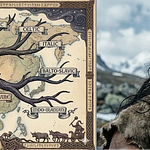On this episode of Unsupervised Learning Razib reviews the year in paleoanthropology and previews the year to come with John Hawks. First, they tackle the latest discoveries regarding Homo naledi, in particular, the finding that they likely used fires deep in the caves where they buried their dead. Hawks reflects on the implications of Homo naledi, a very small-brained hominin that mastered several elements of human culture, for our understanding of hominin evolution and the expected trajectory of the evolution of these groups of species. Razib and Hawks also discuss Denisovans and the profusion of human lineages discovered in Southeast Asia over the last few years.
Finally, the discussion moves to the possibilities of ancient DNA and even ancient protein analysis. Hawks reports that soon there will be publications that push protein analysis back to the Miocene, more than 5 million years ago, with speculation about future discoveries that could go as far back as 20 million years.












